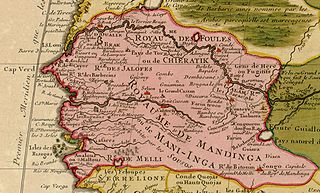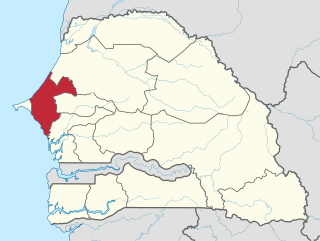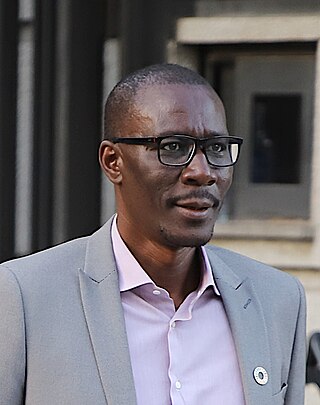| Total population | |
|---|---|
| 50 | |
| Regions with significant populations | |
| Dakar | |
| Languages | |
| French, Hebrew, Judeo-Arabic (historically) | |
| Religion | |
| Judaism |
| Part of a series on |
| Jews and Judaism |
|---|
The history of the Jews in Senegal has its origins in the Jews of Bilad al-Sudan, those Jewish communities in West Africa dating to the 14th century. Today only a small number of Jews live in Senegal, mostly of foreign origin.
During the 14th and 15th centuries, Jews who had left or been expelled from Spain, Portugal, Morocco, North Africa, and the Middle East formed communities throughout West Africa. Sephardi Jews from Spain, Portugal, and Morocco settled along the coast of Senegal and on the islands of Cape Verde. Following the rise of Islam in the region, these Jewish communities have gradually disappeared due to assimilation and migration. [1]
During the early 17th century, a group of Portuguese Jewish traders formed communities in the town of Joal-Fadiouth and elsewhere along the Petite Côte in the region of Senegambia, trading with West Africa, Portugal, and the Netherlands. [2] Despite the opposition of Catholic Portuguese government, the Jews of Joal-Fadiouth were protected by the local chief and were allowed to openly practice their religion.
During the Holocaust, some Jews in Senegal were taken by the colonial Vichy administration to an internment camp in Sébikhotane for forced labor. The location of the internment camp has been located, but the functions of the buildings have not yet been identified. [3] Two Jewish refugees who had escaped Europe were captured in Dakar and temporarily taken to the Sébikhotane internment camp and then transferred to the Office du Niger, a large cotton farm in Mali where the French colonial authorities used slave labor. [4]
The residents of the village of Bani Israël are almost entirely Muslim and belong to a tribe that means "sons of Israel". Members of the tribe trace their lineage to two clans, Sylla and Drame, which they claim to be descended from Egyptian Jews. Despite claiming Jewish ancestry, members of the tribe are practicing Muslims and do not wish to become Jewish. According to former town president Dougoutigo Fadiga, "we don't like to talk too much about our Jewish background, but we don't hide it either. We know our people came from Egypt to Somalia, and from there to Nigeria, where they split about 1,000 years ago. One branch of the two families went to Mali, another to Guinea, and we settled here." However, one cultural trait the tribe shares with Judaism is an aversion to intermarriage; members of the tribe avoid assimilation and do not marry members of neighboring tribes. Disagreement exists as to the veracity of the tribe's claim of Jewish descent. Gideon Behar, Israel's ambassador to Senegal, has said that he believes the tribe is likely of Jewish descent. The Senegalese writer Abdoul Kader Taslimanka, who has written a book about the tribe, has doubted the tribe's claim of Jewish descent and believes the town's name has nothing to do with Jews but is rather named after a chapter from the Koran. [5]
In contemporary Senegal, there are around 50 Jews in the country. The small community is based in Dakar and is mostly composed of French Jews and American Jews working for international organizations, as well as Israeli Jews who have married local Senegalese people. Jewish communal life is closely tied to the Israeli Embassy in Dakar, where people gather for Shabbat and Jewish holidays. [6]

Senegal, officially the Republic of Senegal, is the westernmost country in West Africa, situated on the Atlantic Ocean coastline. Senegal is bordered by Mauritania to the north, Mali to the east, Guinea to the southeast and Guinea-Bissau to the southwest. Senegal nearly surrounds The Gambia, a country occupying a narrow sliver of land along the banks of the Gambia River, which separates Senegal's southern region of Casamance from the rest of the country. Senegal also shares a maritime border with Cape Verde. Senegal's economic and political capital is Dakar.

The history of Senegal is commonly divided into a number of periods, encompassing the prehistoric era, the precolonial period, colonialism, and the contemporary era.

Thiès is a region of western Senegal. The capital is also called Thiès.

The flag of Senegal is a tricolour consisting of three vertical green, yellow and red bands charged with a five-pointed green star at the centre. Adopted in 1960 to replace the flag of the Mali Federation, it has been the flag of the Republic of Senegal since the country gained independence that year. The present and previous flags were inspired by the French tricolour, which flew over Senegal until 1960.

African Jewish communities include:
Joal-Fadiouth is a town and commune in the Thiès Region at the end of the Petite Côte of Senegal, south-east of Dakar.
The Petite Côte is a stretch of coast in Senegal, running south from the Cap-Vert peninsula to the Saloum Delta, near the border with the Gambia.

Sahelian Jews historically known as Jews of the Bilad al-Sudan describes West African Jewish communities connected to known Jewish communities who migrated to West Africa as merchants for trading opportunities. Various historical records state that at one time, they were present in the Ghana Empire, the Mali Empire, the Mossi Kingdoms and the Songhai Empire, which was then called the Bilad al-Sudan "Land of the Blacks".
Nianing is a city in Petite Côte, Senegal, south of Dakar, 8 kilometres (5.0 mi) from M'Bour.
United to Boost Senegal is a Senegalese political coalition. It was active in the 22 March 2009 Municipal elections in that country. The coalition was made up of members of parties opposed to President Abdoulaye Wade's ruling Senegalese Democratic Party and its Sopi Coalition. Coalition partners included the Socialist Party of Senegal, Alliance of the Forces of Progress, Front for Socialism and Democracy/Benno Jubël, and Reform Movement for Social Development. Prominent BSS members include Khalifa Sall, Biram Sassoum Sy, Doudou Issa Niasse, and Haoua Dia Thiam. The party's colours are Green and Yellow.

Igbo Jews are members of the Igbo people of Nigeria who practice Judaism.
Bani Israël is a village in the rural commune of Kataba I, in the Bignona Department of the Ziguinchor Region of southwestern Senegal. In 2002 it had a population of 74.

The Battle of Logandème was an uprising led by the Serer King Maad a Sinig Kumba Ndoffene Famak Joof, king of Sine, against the French Empire. The battle took place at Logandème which was a part of Sine at the time. The battle was also a revenge attack against the Serer people after their resounding victory against France at the Battle of Djilass on 13 May 1859. It was the first time that France decided to employ cannonball in the Senegambia.
Zera Yisrael, known also as Zera Kadosh is a legal category in Halakha that denotes the blood descendants of Jews who, for one reason or another, are not legally Jewish according to religious criteria. This is usually due to a lack of matrilineal Jewish ancestry.
Sébikhotane is a town in the Dakar Region of western Senegal. It is in the Rufisque Department. The population in 2013 was 27,402.

Luc André Diouf Dioh is a Senegalese-Spanish politician as well as a trade unionist and syndicalist. He is known in the Spanish media for being the first politician of African descent elected from the Spanish Socialist Workers' Party, as well as for being homeless in the past and having to sleep on a beach of the Canary Islands for over a month.
The history of the Jews in Mali dates back to the 8th century CE. Today, around 1,000 descendants of Jews live in Mali, mostly in or near Timbuktu.
The history of the Jews in the Gambia dates back to the 16th and 17th centuries, when Sephardi Jewish explorers and traders came to the region of Senegambia. In contemporary Gambia, a Jewish community of local converts has emerged during the 2010s and 2020s.
The history of the Jews in Guinea-Bissau date back at least to the 15th century, when Sephardi Jewish traders and explorers arrived in the region from Portugal. Portuguese Sephardi Jews maintained a presence in colonial Guinea for centuries. The contemporary Jewish community in Guinea-Bissau is small.
The history of the Jews in Benin is recent and the contemporary Jewish community in Benin is very small.